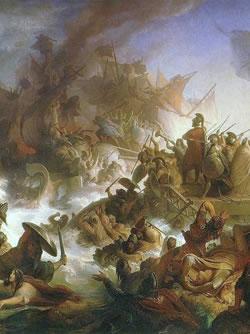Canada: Reflections at 150
The year 2017 is set to be one of celebration and reflection across Canada. July 1 of this year will mark the 150th anniversary of the birth of the nation, when four provinces formed a confederation known as the Dominion of Canada. Events are planned across the country throughout the year to mark this milestone. It also serves as an opportunity to look back on Canada’s successes and failures over the past 150 years, and should prompt us to ask important questions, such as “How did we come to be where we are?” and “Where are we going?” Perhaps the most important might be “Is there a better alternative?”
Overall, Canadians should look on the last 150 years with a certain amount of satisfaction. What began with just four provinces now spans from the Atlantic Ocean to the Pacific, stretching to the far reaches of the North and the Arctic Ocean. A trans-continental rail system, the discovery of insulin, and the establishment of a publicly funded health care system are just a few of the accomplishments that many Canadians look on with pride. As with any nation, Canada’s past—and present—includes some regrettable moments as well. Corruption, scandal and injustice have been extant in one form or another from time to time, and how any of them have impacted you or your loved ones would certainly colour your view of Canada’s accomplishments. It has by no means been a perfect 150 years, and one must ask where the decisions being made today will lead this country in the future.
Despite its shortcomings, Canada is consistently ranked favourably in lists of nations with the best reputation (“The 19 countries with the best reputation in the world,” BusinessInsider.com, August 12, 2016), quality of life (“Quality of Life Rankings,” USNews.com), and safety (“The Ten Safest and Ten Most Dangerous Countries In the World,” TheWeek.co.uk, June 8, 2016). Is there a secret to Canada’s successes?
Good Land and Stable Government
When examining why some nations develop one way while others develop another, it is helpful to start by looking at every nation’s most basic possession—the land itself. A nation with limited water resources, land that is difficult to farm or extreme weather conditions is going to have a hard time thriving. Through no great act of its own, Canada has been blessed with rich farmland, seemingly unlimited fresh water, and vast natural resources such as timber, natural gas, copper, lead, gold and silver. These blessings provided a foundation for the young nation, setting it on a path to prosperity. Regular readers of Tomorrow’s World recognize that these blessings were not afforded us due to our own greatness. Rather, they form part of the birthright blessing first promised to Abraham (Genesis 12:1–3; 13:14–16) and then passed down through Isaac and Jacob to Joseph’s sons, Ephraim and Manasseh (Genesis 35:10–11). For more details on how Canada, the United States, Great Britain, Australia, New Zealand and other nations have reaped the benefits of these ancient promises, read our free booklet The United States and Great Britain in Prophecy.
Yet, resources alone are not enough for a nation to truly prosper. The experiences of several modern countries teaches us that newly discovered resources resulting in an influx of riches for the nation as a whole do not always translate to an improved quality of life for the average citizen. Canada, along with other leading nations in the world, has also greatly benefited from stability in government and the rule of law. One merely needs to look to the Ukraine, the Congo or Syria to see that a breakdown in government leads to a breakdown in society itself, so that it is no longer conducive to innovation, prosperity or even basic peace and safety. The fact that Canada has avoided such a breakdown throughout its history and has remained relatively unified has resulted in an environment favourable to growth and achievement. Let’s be clear—Canada’s government is not without its shortcomings. But a quick survey of the world’s dictatorships and failing states reveals that we have much for which to be thankful. One hundred and fifty years of government stability is no small blessing.
Could It Be Better?
Now imagine what could be accomplished over a much longer span of time. What could be accomplished in 1,000 years? What if the imperfect government of Canada, or of any other nation for that matter, were replaced with a perfect government, headed by Jesus Christ Himself? It is hard to fathom what could be achieved in such conditions. The book of Revelation makes plain that such a reign will soon take place! John recorded that the saints will live and reign with Christ for one thousand years (Revelation 20:4).
Many prophecies in the Bible paint a vivid picture of this idyllic time. Peter refers to this time as “the times of restoration of all things” (Acts 3:21). Isaiah describes the deserts blossoming with life (Isaiah 35:1–2) and a time of great healing (Isaiah 35:5–6). Zechariah reveals the sense of peace and safety that will be enjoyed by young and old alike (Zechariah 8:4–5). All of this will be brought about by righteous government headed by Jesus Christ (Isaiah 9:6–7).
The coming Messiah will not be the only one providing leadership at this time. Ezekiel records that King David will be raised from the grave and reinstated as king, under Christ, over all the nation of Israel (Ezekiel 37:22–25). Not only does this include modern “Israel”—the small Jewish nation in the Middle East—but also, as we have shown in numerous articles, telecasts and booklets, several other prominent nations of the world. Jesus Himself promised that rulership of each of the twelve tribes of Israel would be given to His resurrected Apostles (Matthew 19:28).
Paul describes this resurrection from the dead, revealing that “the dead shall be raised incorruptible” (1 Corinthians 15:42–44, 51–53). Jesus Christ, along with the saints who have been resurrected as incorruptible spirit beings, will form the world’s first perfect government. That perfect government will rule over the world for a thousand years (Revelation 20:4)! It is impossible for us to fully grasp the dramatic effect this will have on the world. As the Apostle Paul says, it has not even “entered into the heart of man the things which God has prepared for those who love Him” (1 Corinthians 2:9). Yet he explains that there is a way for us to understand this! “But God has revealed them to us through His Spirit” (v. 10).
We can learn about this wonderful time through His Spirit, which is given to those who obey Him (Acts 5:32). By keeping the Holy Days commanded in Scripture, we can learn about God’s ultimate plan of salvation, as each biblical Festival pictures a vital step of that plan. Paul refers to these annual Sabbaths as shadows of things to come (Colossians 2:16–17), and so they are, as they foreshadow such future events. You may be surprised to learn that there are Christians today around the world who celebrated the Feast of Tabernacles last fall (Leviticus 23:33–42; John 7:2, 8–10), picturing the reign of Jesus Christ on this earth—a thousand years of unprecedented peace and prosperity! To learn more about these Holy Days, be sure to read our free booklet: The Holy Days: God’s Master Plan.






